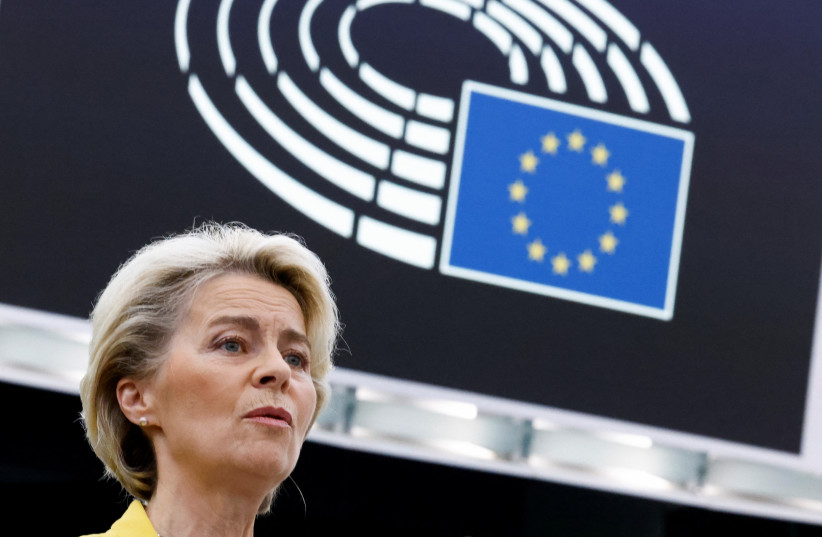Israel celebrates another year of independence, and without a doubt, anti-Israel “activists” use the time to hijack the narrative and attempt to rewrite history.
This past Independence Day in Israel was special as the Jewish nation celebrated 75 years of statehood. Despite our hardships in the last few years, seeing our accomplishments since our founding is deeply empowering. Jewish people worldwide celebrated this milestone, and we received a warm message of congratulations from global leaders and allies, including the president of the European Commission, Ursula von der Leyen.
In a speech addressed to Israeli President Herzog, she stated, “Seventy-five years ago, a dream was realized with Israel’s Independence Day.” She then praised Israel’s world-renowned innovation and tech advancement and made a beautiful statement that unexpectedly led to “controversy.”
“You [Israel] have literally made the desert bloom,” and referenced how she saw it with her own eyes when she visited Israel’s Negev.
Immediately, anti-Israel figures went on a Twitter bashing spree, attacking von der Leyen, calling her a liar. Many took issue with her “desert bloom” line, claiming the Palestinians were the ones who flourished the land. The Palestinian Authority Foreign Ministry even published a statement describing the phrase as a “racist trope” that will lead to the “erasure” of the Palestinian people.
The PA statement read: “The State of Palestine affirms that such propagandist discourse dehumanizes and erases the Palestinian people and falsifies their rich history and civilization. Likewise, such a narrative perpetuates the continued and racist denial of the Nakba and whitewashes Israel’s illegal occupation and apartheid regime. President Ursula von der Leyen owes them and the Palestinian people an apology.”
“The State of Palestine affirms that such propagandist discourse dehumanizes and erases the Palestinian people and falsifies their rich history and civilization. Likewise, such a narrative perpetuates the continued and racist denial of the Nakba and whitewashes Israel’s illegal occupation and apartheid regime. President Ursula von der Leyen owes them and the Palestinian people an apology.”
Palestinian Authority Foreign Ministry
The statement was later deleted but the damage had already been done.
It is disturbing how easily figures and politicians can ignore history and facts to spread baseless inaccuracies to push an agenda. Even more, attacking Israel in such a ridiculous way only minimizes the valid concerns facing the Palestinian people.
The Jews really did make the desert bloom – this is irrefutable
The irony behind all of this is that the cultivation of Israel by early Jewish immigrants is not just a tiny random fact; it led to a major shift in the region and developed the modern Middle East in unimaginable ways.
The fact that early Jewish immigrants took a desert wasteland and turned it into the flourishing and thriving place we see today is irrefutable. As waves of Jewish immigrants began to return to their ancestral homeland in the late 19th century, during the Ottoman Empire’s rule of the region, they returned to a barren land that was sparsely populated, with few natural resources and limited water supply.
IN 1866, American author Mark Twain visited the region and signed an agreement to write fifty-one short articles throughout his journey. However, Twain’s visit to the Holy Land was not impressive. In one passage, Twain wrote, “The further we went, the hotter the sun got, and the more rocky and bare, repulsive and dreary the landscape became.”
In a famous passage in 1867, Twain clearly illustrates what the region looked like before Jewish immigration. He described it as “a desolate country whose soil is rich enough but is given over wholly to weeds – a silent mournful expanse... A desolation is here that not even imagination can grace with the pomp of life and action... We never saw a human being on the whole route... There was hardly a tree or a shrub anywhere. Even the olive and the cactus, those fast friends of the worthless soil, had almost deserted the country.”
Despite coming home to a barren land filled with swamps and malaria, Jewish immigrants were determined to rebuild their homeland and began to cultivate the land. They used modern agricultural techniques, such as terracing, crop rotation, and irrigation, to develop the land and increase productivity. Jewish immigrants expanded trade and tourism, making the Holy Land popular and contributing to the growth of coastal cities like Jaffa, Tel Aviv, Haifa and Acre.
They also transformed the countryside toward the end of the Ottoman period with communities of Jewish farmers settling in the Galilee and the Jezreel Valley. According to the Jewish Virtual Library, the impact made by these Jewish farmers is well documented in travelers’ accounts, official documents, and reports of explorers.
It can also be seen in pictures taken by photographers who recorded the country while providing souvenirs for the growing tourist market. Under the British Mandate, the Jewish population continued to develop the land, building roads, schools, and hospitals and establishing a thriving economy.
Fast forward to 2023, Israel is a global leader in AgriTech, even sharing its knowledge with developing countries. Since establishing ourselves as a state, we have built desalination plants and wastewater treatment facilities to conserve water sources. As a country, Israel invested in research and development of advanced technologies, including drip irrigation, hydroponics, and genetically modified crops, which have greatly improved agricultural productivity.
One of our most notable achievements was transforming the Negev desert (which covers half our territory) through innovative irrigation systems, including drip irrigation and underground pipelines, to deliver water to the crops more efficiently. Today, Israel is a leading exporter of agricultural products and technology, demonstrating the remarkable success of Jewish efforts in making the desert bloom.
Contrary to what anti-Israel figures try to say, the Jewish people transformed this region in the Middle East into a prosperous country. Saying so is a fact, not a “racist remark” against Palestinians. Our success in making the desert bloom is a testament to the Jewish people’s determination, hard work, and innovative spirit.
The writer is a social media activist with over 10 years of experience working for Israeli, Jewish and cause-based NGOs. She is the co-founder and the COO of Social Lite Creative, a digital marketing firm specializing in geopolitics.

